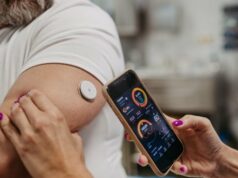
Dr Ian Lake is a 59-year-old GP and has lived with type 1 diabetes for 23 years. For the first 20 years he was on a conventional diet. After starting to get diabetes complications, he converted to a very low carbohydrate diet with transformative results.
For the last three years, while following a low carb lifestyle, all of his HbA1c readings have been in the non-diabetic range and for the last 18 months, all but one of his HbA1c reading have been in the normal population range.
As a result of his new found energy and a second wind, he successfully completed a year of monthly half marathons while following a low carb lifestyle, over half of them after an overnight fast, to show that low carb is a safe and effective option in type 1 diabetes, even when factoring in endurance sports.
The 730 mile run
Recently, Ian completed a 730-mile run over five weeks, running an average of 20 miles per day. Although he knew that attempting this was medically safe in terms of his diabetes, he had never done such a large volume of running before, and was essentially running into unknown territory from a physical point of view. Still, he was determined to demonstrate once again that a low carb lifestyle is a valid management option for people with type 1 diabetes.
The run was solo, unsupported and involved some wild camping. Ian carried all 5kg of his equipment in a rucksack. He used local accommodation: “I buy my food from whatever shop is on the route… but it has been a challenge to get a good choice of low carb foods in the more remote areas”.
Some of the terrain was gruelling and he has experienced daytime summer temperatures often over 30 degrees.
On average, his diet throughout the run consisted of 9% carbohydrate, 69% fat and 22% protein, by calories. By comparison, the diet that is currently recommended to people with type 1 diabetes contains around 55-60% carbohydrate. By eating to his body’s demand for food, rather than to any particular calorie goal, he initially lost 9 pounds over a portion of the run, before keeping his weight stable for the remainder.
“After much experimentation I have come to the conclusion: eat when hungry, drink water when thirsty. Listen to the body, Simple. It has worked for me”, says Ian.
Ian has monitored his glucose and ketone levels throughout the run and has the benefit a continuous blood glucose meter, which he thinks all type 1s should have access to. He took his insulin through pen injections, maintaining an average glucose level of 7.0 mmol/L with an HbA1c of 39 mmol/mol (which is within normal range) at the end of the 730 miles. He kept his ketones within the range for nutritional ketosis, with no risk of diabetic ketoacidosis. He also noted that he had around half the number of hypos (hypoglycaemic episodes) compared with conventional management, and that he was able to run through most of them.
Ian’s thoughts on very low carb diets in type 1 diabetes
“My life has been utterly transformed for the better since I accidentally Googled Richard Bernstein’s Diabetes Solution book. Embarrassingly, as a doctor, I had never come across it in my field of general practice and I know that a large number of diabetes specialists haven’t either. Adopting a low carb, high healthy fat diet has transformed my life. I have less extreme swings of blood glucose, I rarely get what I would call a proper hypo, and I live life without the shadow of some diabetes crisis or other looming over it every day. Not only that, but all of the side effects rarely discussed have gone away. Dizziness on standing, foggy vision, fuzziness of thinking, general aches and pains.
And it is not only me. There are other doctors around the world with type 1 diabetes doing the same thing with the same excellent results, many thousands of individuals who are opting for this lifestyle, and in the type 1 low carb group that I have joined locally everyone without exception is getting benefit from cutting carbs.
It simply makes diabetes management so much easier, fewer carbs means less insulin. Smaller doses of insulin lead to smoothing out of glucose control with reduced risk of the swings in glucose levels that cause ketoacidosis and hypos. I know I will never come off insulin, and it is a life saver, but I have roughly halved my dose and feel so much better for it.
With current NICE guideline practice, only 3% of people get to the relatively modest HbA1c target of 48mmol/mol. However, in a Facebook community on a low carb lifestyle (type1grit), mainly children, only 3% FAIL to reach that level. There is something very wrong with conventional advice when 97% of the diabetes population cannot reach the target.
I think that I have thoroughly road-tested very low carb diets in type 1 diabetes to an extreme level and shown it to be a very safe option for some people with type 1 diabetes to consider. For a great many people this could be the way out of the misery of erratic day to day problems with control, improvement of a sense of wellbeing and a reduction of long term complications.”
Dr Lake is collaborating with GroHealth, the people behind Diabetes.co.uk (the world’s largest diabetes community), and creators of the award-winning Low Carb Program, to produce a program to enable people with type 1 diabetes to safely transition to a low carb lifestyle. Healthcare professionals may also use and support the program: www.type1program.com.
If you would like to read more about Ian’s experiences and view his diet and blood monitoring results in more detail, visit his personal blog at type1keto.com.








